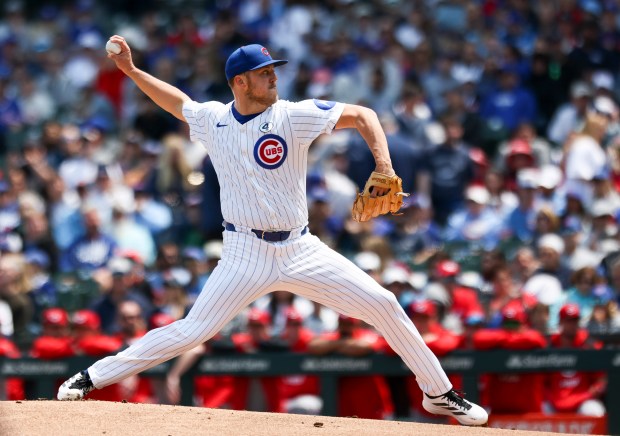In the wake of the mistrial in the AT&T bribery case last week, a federal judge said Tuesday he will hold rare oral arguments on a defense motion for acquittal and that they will “go back to the drawing board” on jury instructions if the case is retried.
U.S. District Robert Gettleman’s comments came in the first hearing since a jury on Thursday deadlocked 11-1 in favor of conviction for Paul La Schiazza, the former president of AT&T Illinois accused in a scheme to bribe then-House Speaker Michael Madigan to win support for the company’s legislation in Springfield.
The Tribune reported after the trial that the jury had serious questions about a key part of the bribery instruction, which was altered to satisfy a U.S. Supreme Court decision in June that raised the bar for prosecutors in a number of Illinois public corruption cases.
After prosecutors told Gettleman on Tuesday that they intended to retry the case, the judge ordered La Schiazza’s defense team to file their motion for judgment of acquittal, known as a “Rule 29” motion, by Friday.
Such motions are routine and almost always denied without a hearing. But because of the issues involved, Gettleman said he would instead hold oral arguments on Nov. 14.
“I’m going to take a very serious look at this motion, and if I deny it, I think we have to go back to the drawing board on jury instructions, because I believe we can improve on them,” Gettleman said, adding that he anticipated filing a written ruling to establish a better record.
“As we know this whole area is in a state of flux,” the judge said. “I think the issue is important enough to write on.”
Meanwhile, the oral arguments in La Schiazza’s case will land in the middle of Madigan’s own trial on racketeering charges, which kicks off in two weeks and could pose similar problems for prosecutors, particularly on several counts where they now have to prove there was an agreement with Madigan ahead of time to exchange something of value for an official act.
Gettleman alluded to the Madigan trial during Tuesday’s hearing, noting that it has “similar issues” to the one’s they were dealing with.
“Maybe we get some guidance from the (7th Circuit U.S.) Court of Appeals or the Supreme Court, who knows,” the judge said. “We certainly could use it.”
If there is a retrial, Gettleman said it would probably not happen until spring or summer of 2025, due to his schedule.
In its decision in appeal of former Portage, Indiana, Mayor James Snyder, the high court ruled that “gratuities” — or gifts given as a thank-you for actions a public official has already taken — are not criminalized under the federal statute.
And bribery, the justices made clear, has to involve two parties who, with corrupt intentions, make an explicit agreement to exchange benefits for official action. It requires “the corrupt state of mind and the intent to be influenced in the official act,” the court wrote in the Snyder ruling.
How ominous a sign the La Schiazza mistrial is for the U.S. attorney’s office remains to be seen, but it’s the second post-Snyder public corruption case in a row where prosecutors have failed to win a conviction.
But jurors said they struggled with the question of intent when it comes to allegations of influencing public officials.
Juror Jocelyn Duran said she came away from the La Schiazza trial having learned a lot about politics and its often-blurred edges. There was not much daylight, she said, between the language of the bribery statute and the definition of “lobbying” that jurors were given during the testimony.
“The rules and regulations surrounding lobbyists are not very clear at all, and that fine line between lobbying and bribing or any other kind of illegal act is very hard to determine,” Duran, 29, a market researcher from Chicago, told the Tribune on Thursday evening.
Another juror, a 62-year-old Naperville man, was among several from the panel who stayed behind to talk to lawyers in the case in open court. He told the defense team that their discussions bogged down over whether there had been an “exchange” between La Schiazza and Madigan and if La Schiazza knew that it was improper.
“We really struggled with (La Schiazza’s) intent,” he said, adding that without the defendant taking the witness stand, “We could only deal with what was presented to us.”
La Schiazza, 66, was charged in an indictment returned by a federal grand jury in October 2022 with conspiracy, federal program bribery and using a facility in interstate commerce to promote unlawful activity. The most serious counts carry up to 20 years in prison if convicted.
The charges alleged La Schiazza agreed in 2017 to pay $2,500 a month to retiring state Rep. Eddie Acevedo, Madigan’s onetime assistant majority leader, through the lobbying firm of longtime Madigan political aide Tom Cullen.
In exchange for the payments, the speaker helped shepherd AT&T’s bill ending mandated landline service, known by the acronym COLR, through the General Assembly, giving La Schiazza a career notch on his belt and saving the telecommunications giant millions of dollars, according to prosecutors.
La Schiazza’s attorneys argued that the contract for Acevedo was nothing more than legal lobbying, which by its very nature is attempt to gain the favor of a politician. They also said there was no evidence of a connection between the decision to pay Acevedo and any official act taken by Madigan.
jmeisner@chicagotribune.com



